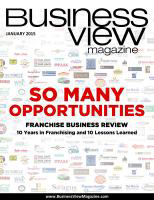30 minutes with Roy Snell, CEO of Health Care Compliance Association
BUSINESS VIEW: Talk about the history of the organization – in terms of how it’s evolved, was this always the plan? Have things taken different directions based on circumstance or anything else?
SNELL: In the mid-90s, a few of us held a one-day compliance conference in Minneapolis. The experience of connecting with others was so helpful we formed a group called the Health Care Compliance Association (HCCA). In 2004 we started the Society of Corporate Compliance and Ethics (SCCE) to help compliance professionals in all industries. In the last few years we have begun to help compliance professionals all over the world. From day one we discussed helping the entire profession but we took it one step at a time and as a result the organization is built on a strong foundation. Our mission has always been to help people understand the role of a compliance officer and the function of a compliance program through education, networking and certification.
BV: What sort of membership numbers are you at and how has that changed over the recent past?
SNELL: We now have about 14,500 members. About 9,750 are in healthcare. SCCE has about 4,750 members. There are small number are from outside the U.S. There are members from about 65 countries. The HCCA is growing at about 7 percent a year. SCCE is growing at about 20 percent a year. There has been very steady growth over the years.
BV: What sorts of people/entities tend to be members and why? Do you have a particular segment that’s grown the fastest? What do a majority of those people/entities tend to look like?
SNELL: The majority of our members work in the compliance department. However, we have members from audit, legal, risk, ethics, leadership, academia, government, etc. The common thread is an interest in the role of the compliance officer and the function of a compliance program. The growth really has come from all over. We have a very diverse membership. We benefit from the diversity. Most of our members come from mid to large sized organizations.
BV: Are there certain issues that are on the minds of the members? Are there any specific things that are pressing issues to the group as a whole?
SNELL: The members’ interests can be broken down into three categories. Some are studying the risk areas and associated laws. Others are focused on the various elements of a compliance program, such as audit, risk, education, etc. Others are focused on the role of the compliance officers. Although members may have a primary focus in each of these areas, they spend time in all three areas. The real pressing issues tend to be within the role of the compliance officer. We have many people in business who understand the laws. We have many people in business who understand various elements of a compliance program. The reason our profession was created is because no one fulfilled the role of the compliance officer. They did not fill that role because it was difficult. It was difficult because the compliance professional has to stand up when the going gets tough and fix material issues. Enron, Penn State University, Tyco and many other major compliance and ethics failures had people who knew the problem existed but did nothing. They ran from the fire, compliance professionals run toward the fire. One of the most important issues our members face and one of the most important roles our organization plays is to help compliance professionals be that person who can prevent or correct the next big issue and live to tell about it.
BV: Are there certain issues that you feel are going to be a lot more high profile a few years from now?
SNELL: Laws change. Risk areas change. The focus of the enforcement community changes. People love to talk about the next law or enforcement activity that will be a hot issue, but it really doesn’t matter. What matters is the compliance officer has to develop the skills to help leadership make tough decisions. The main issue will always be the intangible skills such as negotiation, collaboration, compromise, influence, etc. That is what was missing before our profession was created and it was missing because it was hard. It was hard because there was a lot at stake and there were people at the center of all major compliance failures who were powerful and advocated for deny and defend as opposed to reveal and remediate. The biggest issue for compliance professionals will always be preventing the people who want the CEO to bury his/her head in the sand from being successful.
BV: In terms of ways that you engage your membership – what have been the ones that have had the most resonance? Have you had multiple events? Do you put out publications? How do you stay in contact and what has worked?
SNELL: This is a very interesting question. We stay in contact to a fault. It’s very hard to communicate to 14,500 in a way, because they all need something different on any given day. They all have to be made aware of all the opportunities. We send a lot of emails and printed material because we have a lot of things people can get involved in or learn from. We have more than 70 conferences a year, three publications, many audio conferences, expert videos, a document library and many points of contact on social media. We have more than 1,000 speaking opportunities, more than 300 writing opportunities and endless opportunities to get involved in social media. We stay in touch with our members through all these methodologies and of course by phone and email. We print my phone number, (952) 933-8009, and my email – roy.snell@corporatecomplaince.org – everywhere and everyone is welcome to become engaged. One note of caution. If you are interested in being on a committee to tell people what to do, water down their ideas, slow down their process and get something to put on your resume, please call someone else. If you want to get something done we will connect you with a staff member to help and we will keep the committee guys out of your way.
BV: What do see happening in the next couple of years, next five years – if you can look out that far, what sorts of priorities do you have other than the ones you’ve already mentioned? How do you think things are going to evolve in the industry there between now and then?
SNELL: As I mentioned, laws, risk areas and enforcement activities will all change, but in reality it is all going to be just the same. It’s fun to predict what regulations will be important next, but it really isn’t important. We will get wind of it, study it and use the compliance program to prevent, find and fix the problem. What is going to be important is that the role of the compliance officer will continue to expand into all risk areas. The compliance officer role will manage all elements of a compliance program. Most important of all, the role of the compliance officer will continue to grow more independent from those who have a conflict of interest. To be successful, compliance professionals need to be responsible for all risk areas, manage all the elements of a compliance program and be free from conflicts of interest. Business is slowly going in this direction. Hopefully in five years, we will have made material progress.
AT A GLANCE
WHO: Roy Snell
WHAT: CEO of the Health Care Compliance Association
WHERE: Baltimore, Maryland
WEBSITE: www.hcca-info.org

